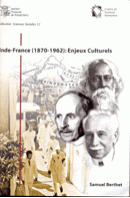Inde-France (1870-1962): Enjeux Culturels

- AuthorSamuel Berthet
- PublisherInstitut Français de Pondichéry / Centre de Sciences Humaines
- Year :2006
- Pages :viii, 676 p., 8 p. of photos, 3 folded maps
- SeriesCollection Sciences Sociales n°12
- Price :800 Rs (35 €)
- ISBN :978-81-8470-144-9
Abstract
The country controlling India is the most powerful in the world, Napoleon said. As soon as the end of the Eighteenth century arrives, Indian culture impulses a new trend in French humanism, notably with Anquetil Duperron. In the early Nineteenth, the elites of the sub-continent ruled by the British start to conceive of French culture as an instrumental factor in modernity making. From 1870 onwards, the attempts of the British authorities to contain their emancipation increased the interest of the Indian elites in French language and culture. If the effort towards emancipation from the British rule takes the Indian elite closer to the country of the Revolution and of the lingua franca of the cosmopolitan elite, the Third Republic leads irrevocably the French nation towards the colonial path. Political, economic but also cultural dynamics will deeply be affected by this choice. Solidarity with the British will prohibit France to start playing the role of privileged partner wished by the Indian elite. By the time of Independence and in the following years, the perception of India and of the relations between the two countries will be considerably altered by the French colonial experiment of the past decades.









